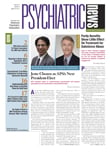Premenstrual mood exacerbation may be a clinical marker predicting a worse presentation and course of bipolar disorder in reproductive-age women.
Women who have bipolar disorder and also experience premenstrual mood exacerbation appear to have a worse course of illness, a shorter time to relapse, and greater symptom severity than women with bipolar disorder who do not experience premenstrual mood exacerbation, according to a report that was published February 15 online in AJP in Advance.
"Mood exacerbation" was defined in the study as syndromal—corresponding to the DSM-IV mood states (depression, mania, hypomania, mixed)—or subsyndromal, not meeting criteria for any of these states but having three or four depression and/or mania symptoms.
"Although time to relapse to a syndromal episode did not differ between women with premenstrual exacerbation and those without during follow-up, time to relapse in those with premenstrual exacerbation was half that of those without when relapse was defined more broadly as a syndromal or subsyndromal episode," wrote lead author Rodrigo Dias, M.D., and colleagues at Massachusetts General Hospital. "Women with premenstrual exacerbation also had more severe depressive and mood elevation symptoms during follow-up, reflecting greater symptom burden. Taken together, these findings suggest that premenstrual exacerbation may be a marker for a more recurrent and symptomatic course of illness among premenopausal women with bipolar disorder."
In the study, 932 women aged 18 to 40 who were enrolled in the Systematic Treatment Enhancement Program for Bipolar Disorder (STEP-BD) responded to two questions about premenstrual mood changes: "Currently, do you typically experience depression symptoms around your menstrual period?" and "Currently, do you experience mood swings around your menstrual period?" Women who provided a positive response to one or both of these questions were categorized as having premenstrual exacerbation.
After exclusion of women with previous unspecified gynecological surgeries and women for whom information was lacking about whether they had menstrual cycles, a total of 293 women—191 women with premenstrual exacerbation and 102 women without—were followed prospectively for one year.
During follow-up, women with premenstrual exacerbation had more mood episodes overall than those without, including more depressive episodes, though the women did not have more episodes of mania or hypomania. Differences remained when episode frequency was categorized; women reporting premenstrual exacerbation were more likely to have one to three episodes a year (73.8 percent compared with 55.9 percent) and less likely to have no episodes (24.1 percent compared with 42.2 percent) during follow-up.
Time to relapse was compared among 129 women (66 with premenstrual exacerbation and 63 without) who were in recovered status at baseline and had at least one additional assessment during the follow-up period. No significant difference was seen between groups in time to relapse to a syndromal episode; however, when the analysis included subsyndromal episodes as part of a broader definition of relapse, women with premenstrual exacerbation relapsed sooner on average than did those without, according to the report.
Using this broader definition of relapse, the median time to relapse was 4.5 months in the group with premenstrual mood exacerbation, compared with 8.5 months in the group without it, a statistically significant difference. (No significant differences between groups were seen in the proportion of women changing medications before they relapsed.)
Finally, statistical analysis of severity of symptoms as reported by women indicated that premenstrual exacerbation adversely affects the severity of both depression and mood elevation symptoms.
Dias told Psychiatric News that the results suggest that clinicians treating women with bipolar disorder should follow the menstrual cycles of patients during appointments and ask them to make notes about the mood changes between appointments.
"In the last five years, the scientific literature has been paying more attention to the subsyndromal mood states in depression and in bipolar disorder," he told Psychiatric News. "This kind of mood state, wherein the patient has mood symptoms but does not meet criteria for a mood episode, has been linked with poor functionality and more relapses of mood episodes.
"In our study, we observed that women with premenstrual exacerbation spend more time in that kind of mood state and have more residual symptoms suggesting that they could be considered a group of patients who will have a more severe course of bipolar disorder."
